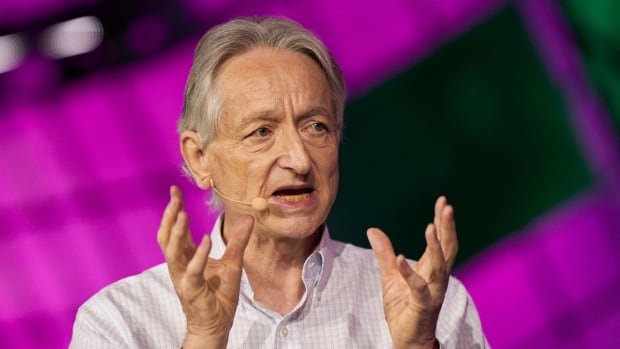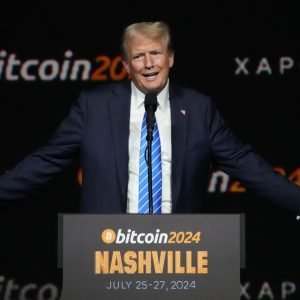
Scientists Geoffrey Hinton from the University of Toronto and John Hopfield of Princeton University were honoured with the 2024 Nobel Prize in Physics for discoveries and inventions that enable machine learning within artificial neural networks, the award-giving body said on Tuesday.
Hinton, born in Britain, has spent the last decade splitting his time between teaching computer science at the University of Toronto and working for Google’s deep-learning artificial intelligence team, before announcing his resignation from the Alphabet company in 2023.
“I’m flabbergasted,” Hinton told the panel gathered at the Royal Swedish Academy of Sciences in Stockholm by phone. “I had no idea this would happen. I’m very surprised.”
Canadian-British artificial intelligence pioneer Geoffrey Hinton says he left Google because of recent discoveries about AI that made him realize it poses a threat to humanity. CBC chief correspondent Adrienne Arsenault talks to the ‘godfather of AI’ about the risks involved and if there’s any way to avoid them.
Ellen Moons, a member of the Nobel committee at the Royal Swedish Academy of Sciences, said the two laureates “used fundamental concepts from statistical physics to design artificial neural networks that function as associative memories and find patterns in large data sets.”
She said that such networks have been used to advance research in physics and “have also become part of our daily lives, for instance in facial recognition and language translation.”
Hopfield created an associative memory that can store and reconstruct images and other types of patterns in data, the academy said.
Hinton invented a method that can autonomously find properties in data and carry out tasks such as identifying specific elements in pictures, it added.
The work of the two prize winners was closely connected. In an interview with News Network earlier this morning, Hinton said that in fact, one of his most influential mentors was on of Hopfield’s students, Terry Sejnowski, who worked with him on his “most exciting research” how to make “Hopfield networks” more general.
AI could get ‘smarter than us’: Hinton
Hinton said he believed the effects of the advancements in artificial intelligence will be comparable to those of the Industrial Revolution, leading to large gains in productivity and offering efficiencies through the development of artificial intelligence assistants that will help in many sectors, including in the delivery of health care.
“It’s going to be fantastic, which is why progress is not going to be stopped. I don’t think we can hit a pause button AI because there’s so many enormous benefits from it,” he told CBC News. “But we really need to worry about how to keep it under control.”
As he has warned since leaving Google, there could be unintended consequences resulting from the advancement of AI technologies being able to write its own computer code.
“We have no experience of what it’s like to have things smarter than us,” he said, while in California on Tuesday.
Hinton has accumulated a number of previous honours, earning the prestigious A.M. Turing Award for contributions to computer science. That same year, he was appointed as a companion of the Order of Canada for developing “learning algorithms that allow computers to recognize speech, interpret images and find structure in complex data sets.”
He first joined the faculty at U of T in 1987, and has been an adviser at the Canadian Institute for Advanced Research.
Asked if he had a preferred online AI tool, Hinton said he has used GPT-4 from OpenAI frequently, though allowing, “I don’t totally trust it, because it can hallucinate.”
The Nobel prizes carry a cash award of 11 million Swedish kronor ($1.44 million Cdn), which is shared between the winners if there is more than one person honoured.
The money comes from a bequest left by the prize’s creator, Swedish inventor Alfred Nobel. The laureates are invited to receive their awards at ceremonies on Dec. 10, the anniversary of Nobel’s death.
The Sunday Magazine23:36Does the ‘Godfather of AI’ think he’s created a monster?: ‘A little bit. Yes’
In a wide-ranging interview with guest host Robyn Bresnahan, Geoffrey Hinton, the British-Canadian computer scientist who left his post at Google this month to sound the alarm about AI’s threat to humanity, says he knows he’s scaring people with his predictions. He hopes he’s scaring politicians into doing something. For the rest of us, he offers some hope: Humanity has survived some big threats before, like nuclear weapons, but only by taking them seriously and getting to work.
The physics award comes a day after two American biologists, Victor Ambros and Gary Ruvkun, won the Nobel Prize in Medicine for the discovery of microRNA.
Nobel announcements will continue with the chemistry prize on Wednesday and the literature prize on Thursday. The Nobel Peace Prize will be announced on Friday and the economics award on Oct. 14.






